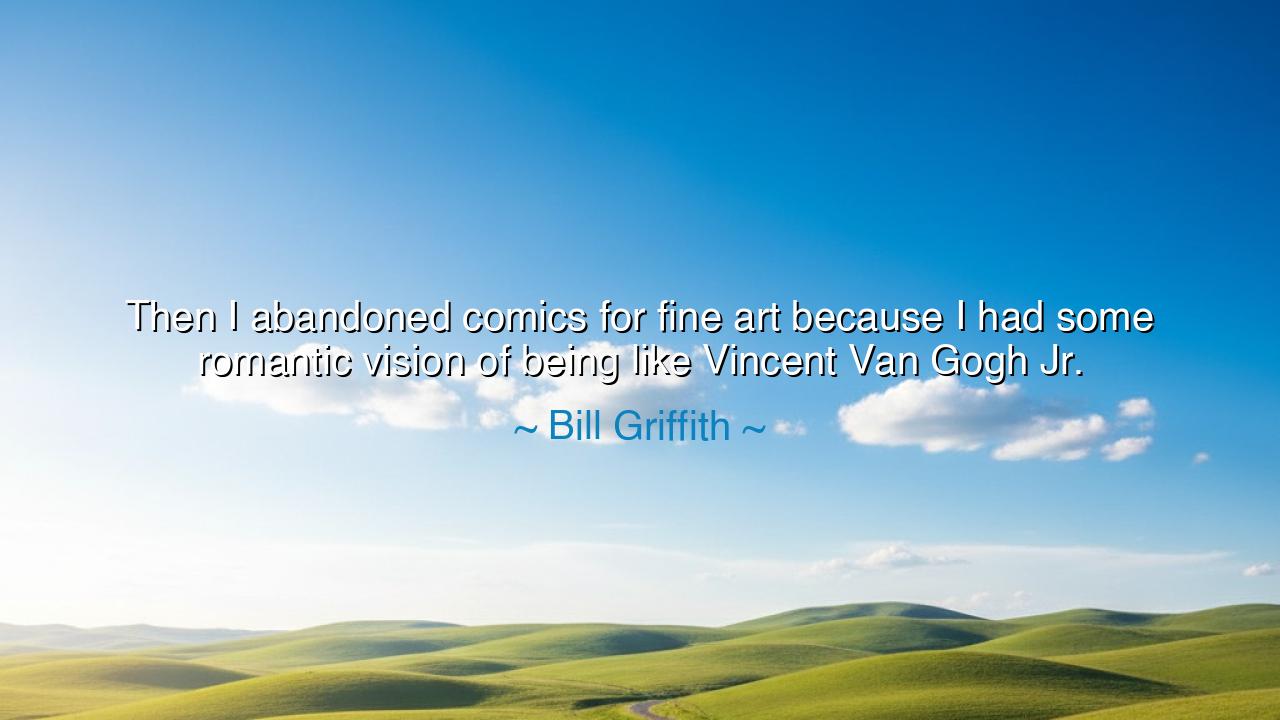
Then I abandoned comics for fine art because I had some romantic
Then I abandoned comics for fine art because I had some romantic vision of being like Vincent Van Gogh Jr.






“Then I abandoned comics for fine art because I had some romantic vision of being like Vincent Van Gogh Jr.” Thus spoke Bill Griffith, and in this confession shines the eternal struggle between humble craft and lofty ambition, between what is seen as lesser and what is honored as eternal. His words reveal a yearning not uncommon in the hearts of artists: the desire to transcend, to suffer nobly, to be counted among the titans of creativity rather than remain in the shadows of the everyday.
The ancients knew such longing well. Poets and sculptors, musicians and dramatists, often dreamed not simply of making art, but of becoming like the gods themselves—immortal through their creations. To embrace a romantic vision of the self is to hunger for more than labor and practice; it is to cast oneself into legend, to live not as a worker but as a seer. Griffith’s desire to be a new Van Gogh reveals the power of myth: that art is not merely creation, but destiny, even martyrdom.
Yet we must remember Van Gogh’s life itself, tragic as it was luminous. He died poor, misunderstood, and broken, yet left behind works that blazed with eternal fire. To imagine oneself as a “Vincent Van Gogh Jr.” is to long not only for genius, but also for the suffering that sanctifies it. Griffith’s romantic vision was not just about painting; it was about embodying the myth of the tortured artist, the one who sacrifices ordinary peace for eternal glory. In this, we see both nobility and danger.
For history shows that the artist who chases legend often stumbles. The quest to be mythic can overshadow the work itself. Consider the story of Lord Byron, who lived not only to write poetry, but to become poetry itself—a man larger than life, both admired and feared. His life blazed brilliantly, but his end was bitter and untimely. In the same way, Griffith’s rejection of comics for fine art shows the ancient temptation: to scorn what seems common in order to embrace what seems transcendent. Yet often, it is in the humble craft—the “comics” of life—that true genius quietly dwells.
This is not to condemn his choice, but to reveal its double edge. The romantic vision inspires, lifts, and drives the artist beyond mediocrity. Yet it can also deceive, whispering that only suffering and grandeur produce worth. Van Gogh’s greatness came not because he sought tragedy, but because he painted relentlessly from the depth of his soul. Griffith, in time, would discover that his truest gift lay not in imitating another’s path, but in embracing his own, even if it bore the name “comic” instead of “fine art.”
The teaching for us is clear: ambition is sacred, but it must be tempered with humility. To dream of greatness is noble, but to imitate another’s tragedy is folly. Each soul must find its own field of creation, whether grand or humble, and in that place, pour out its spirit without shame. For true greatness does not come from being “like Van Gogh,” but from becoming fully oneself.
Practical action flows naturally: cherish your romantic vision, for it fuels the fire within, but do not let it blind you to the worth of your own path. If your gift lies in “comics,” in craft, in daily labor, do not scorn it for the glitter of legend. Work with love where you stand, and in time your creations will shine with their own eternal light. For the world remembers not only those who imitated giants, but those who dared to bring forth the truth of their own souls.
So, children of tomorrow, learn from Griffith’s confession. Dream high, yes, but know that your destiny is not to be the shadow of another, even of a Van Gogh. Your destiny is to be wholly, fiercely, unmistakably yourself. And that, more than any romantic vision, is what makes art eternal.






AAdministratorAdministrator
Welcome, honored guests. Please leave a comment, we will respond soon